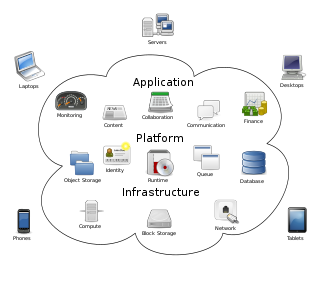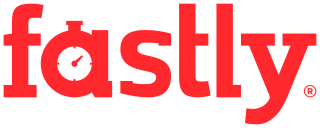Related Research Articles
An autonomous system (AS) is a collection of connected Internet Protocol (IP) routing prefixes under the control of one or more network operators on behalf of a single administrative entity or domain, that presents a common and clearly defined routing policy to the Internet. Each AS is assigned an autonomous system number (ASN), for use in Border Gateway Protocol (BGP) routing. Autonomous System Numbers are assigned to Local Internet Registries (LIRs) and end-user organizations by their respective Regional Internet Registries (RIRs), which in turn receive blocks of ASNs for reassignment from the Internet Assigned Numbers Authority (IANA). The IANA also maintains a registry of ASNs which are reserved for private use.
Internet exchange points are common grounds of IP networking, allowing participant Internet service providers (ISPs) to exchange data destined for their respective networks. IXPs are generally located at places with preexisting connections to multiple distinct networks, i.e., datacenters, and operate physical infrastructure (switches) to connect their participants. Organizationally, most IXPs are each independent not-for-profit associations of their constituent participating networks. The primary alternative to IXPs is private peering, where ISPs directly connect their networks.

Akamai Technologies, Inc. is an American company specialized in content delivery network (CDN), cybersecurity, DDoS mitigation, and cloud services. It is headquartered in Cambridge, Massachusetts.

A content delivery network or content distribution network (CDN) is a geographically distributed network of proxy servers and their data centers. The goal is to provide high availability and performance ("speed") by distributing the service spatially relative to end users. CDNs came into existence in the late 1990s as a means for alleviating the performance bottlenecks of the Internet as the Internet was starting to become a mission-critical medium for people and enterprises. Since then, CDNs have grown to serve a large portion of the Internet content today, including web objects, downloadable objects, applications, live streaming media, on-demand streaming media, and social media sites.

The Toronto Internet Exchange Community (TorIX) is a not-for-profit Internet Exchange Point (IXP) located in a carrier hotel at 151 Front Street West, Equinix's TR2 data centre at 45 Parliament Street and 905 King Street West in Toronto, Ontario, Canada. As of March 2021, TorIX has 259 unique autonomous systems representing 285 peer connections and peak traffic rates of 1.344 Tbps, making it the largest IXP in Canada. According to Wikipedia's List of Internet Exchange Points by Size, TorIX is the 16th largest IXP in the world in numbers of peers, and 17th in the world in traffic averages. The Exchange is organized and run by industry professionals in voluntary capacity.
Average Per-Bit Delivery Cost, or APBDC, is the cost accounting method by which Internet Service Providers (ISPs) calculate their cost of goods sold.

DE-CIX is an operator of carrier- and data-center-neutral Internet Exchanges, with operations in Europe, North America, Africa, the Middle East, India and Southeast Asia. All DE-CIX activities and companies are brought together under the umbrella of the DE-CIX Group AG.

Cloud computing is "a paradigm for enabling network access to a scalable and elastic pool of shareable physical or virtual resources with self-service provisioning and administration on-demand," according to ISO.
Hurricane Electric is a global Internet service provider offering Internet transit, tools, and network applications, as well as data center colocation and hosting services at one location in San Jose, California and two locations in Fremont, California, where the company is based.
Interxion is a provider of carrier and cloud-neutral colocation data centre services in Europe. Founded in 1998 in the Netherlands, the firm was publicly listed on the New York Stock Exchange from 28 January 2011 until its acquisition by Digital Realty in March 2020. Interxion is headquartered in Schiphol-Rijk in the Netherlands, and operates 53 data centres in 11 European countries located in major metropolitan areas, including Dublin, London, Frankfurt, Paris, Amsterdam, and Madrid, the six main data centre markets in Europe, as well as Marseille, Interxion’s Internet Gateway.
Digital Telecom Internet Exchange ("DTEL-IX") is an Internet exchange point (IXP) situated in Kyiv, Ukraine. It was founded in 2009 to help establish peering for Ukrainian and international operators. This IXP currently has 239 members, with a maximum throughput of 2.2 Tbps.

Angola Cables is an internationally established ICT and network services provider. The company specializes in connectivity technologies for the wholesale market and offers digital services across multiple industries, including Cloud resources for the corporate enterprise sector.
France-IX is a Paris-based Internet exchange point (IXP) founded in June 2010 as a membership organisation. As of 21 July 2021 it interconnects more than 496 members, making it the largest IXP in France.
Mumbai Internet Exchange is a subsidiary of the German Internet exchange point (IXP) DE-CIX, founded on 15 August 2014 as Mumbai Convergence Hub as an Open Carrier Neutral Internet Exchange & Peering Hub. As of 30 March 2021 it interconnects more than 375 members, making it the largest IXP in India and surrounding region.

Domain fronting is a technique for Internet censorship circumvention that uses different domain names in different communication layers of an HTTPS connection to discreetly connect to a different target domain than that which is discernable to third parties monitoring the requests and connections.

Fastly, Inc. is an American cloud computing services provider based in San Francisco. Fastly provides content delivery network services, cloud computing, cloud security, image optimization, and load balancing services. Fastly's cloud security services include denial-of-service attack protection, bot mitigation, and a web application firewall.

Bevil Wooding is a Trinidadian technologist and development strategist who is the Chief Knowledge Officer at Congress WBN, a UK-registered charity with operations in over 120 countries. He is known for his work in the field of Information and Communications Technology (ICT) in the Caribbean. In 2010, he was named by ICANN as one of the Trusted Community Representatives for the Domain Name System Security Extensions (DNSSEC) root. Wooding advocates for developing states and emerging economies to create policies, build infrastructure, and leverage human resource capacity for technology-enabled development. He has been described as "a visionary who believes that the Caribbean Economy can be enhanced through ICTs and Internet development.”
Teraco Data Environments is a carrier-, cloud- and vendor-neutral data centre provider founded by Tim Parsonson and Lex van Wyk in 2008. On 1 August 2022, Digital Realty announced that it had completed the purchase of a majority stake in Teraco, previously controlled by Berkshire Partners, Permira and a group of investors.
The Internet Exchange Point Of Nigeria (IXPN) is a neutral and not-for-profit Internet exchange point (IXP) founded in 2006 by the Nigerian Communications Commission (NCC) in partnership with the Internet Service Providers Association Of Nigeria (ISPAN). Among other things, IXPN was created to reduce connectivity costs in millions of dollars in offshore internet bandwidth payments, reduce latency from 900 milliseconds to 30 milliseconds for local content, serve as the central point for connecting Higher Educational Institutions (HEIs) towards the development of National Research and Educational Network (NREN). As at April 2022, IXPN is the 5th largest IXP in Africa by number of peers, and 3rd in Africa by traffic according to Packet Clearing House’s IXP directory
References
- ↑ "MANRS - Network Operators Participants". MANRS. Retrieved 9 February 2021.
- ↑ "MANRS - IXP Participants". MANRS. Retrieved 9 February 2021.
- ↑ Jackson Higgins, Kelly (1 April 2020). "Major Cloud, CDN Providers Join Secure Routing Initiative". Dark Reading. Archived from the original on 2020-04-04.
- ↑ McCarthy, Kieren (31 Mar 2020). "Watch your MANRS: Akamai, Amazon, Netflix, Microsoft, Google, and pals join internet routing security effort". The Register. Archived from the original on 2020-04-07.
- ↑ McCarthy, Kieren (14 Aug 2019). "Mind your MANRS: Internet Society names and shames network operators that bungle their routing security". The Register. Archived from the original on 2020-04-04.
- ↑ Meynell, Kevin (2020-05-13). "MANRS Reaches 500 Networks". MANRS. Archived from the original on 2020-05-21.